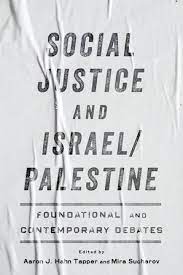Book review. The book’s mission is to study the Israel-Palestine question from a social justice perspective with the aim of “empower[ing] the readers to understand the ways to end the suffering and injustice” in Israel/Palestine and beyond (xi). This mission is carried out by exploring a wide range of issues, grouped under what the book calls “foundational debates” and “contemporary debates”. The first part of the books deals with foundational debates; it delves into narratives, self-determination, settler-colonial- ism and international law. The second part dwells on contemporary debates, covering issues of refugees, apartheid, intersectional alliance and the Boycott, Divestment and Scansion (BDS) movement.

The book charts these complex dimensions of this conflict through critical and engaging discussions, explaining to the reader the core issues as well as the different approaches used to frame the question of Israel-Palestine. Generally, the essays are well-argued and insightful. However, the quality of exposition in place suffers from lapses and weakness. For example, Sam Fleischacker’s essay (64–68) presents a misguided account of settler-colonialism that overlooks its structural nature of elimination of the natives as Patrick Wolfe1 cogently argues. Moreover, the book would have benefited from taking into consideration other debates, such as ethnic cleansing, state-building, recognition, regional and international dimensions of the conflict.
The book is based on serious and honest attempts to engage the reader into the myriad details of the Israel-Palestine question. The discussion unfolds smoothly through the careful structure of the book and the excellent effort it took to make a large number of essays, written by expert authors, communicate with one another in genuine and informative ways. Although the book is a collection of essays, it reads as one piece. The book succeeds in presenting an instructive debate about complex and interrelated issues. However, the book’s lack of a concluding essay to synthase the criti- cal and vibrant discussion into a way forward or a sharp takeaway for the reader did not contribute to the overall mission. Instructive here is George Bisharat’s essay, exploring “six useful pasts” (17) of Jewish and Arab/Palestinian coexistence. Altogether, the book is a powerful contribution that delves into the politics of the Israel/Palestine question, rendering it invaluable reading for under- and postgraduates as well as activists who want to understand these politics.
Emile Badarin 2021. "Social justice and Israel/Palestine: foundational and contemporary debates". Journal of Modern Jewish Studies, DOI: 10.1080/14725886.2021.1903233